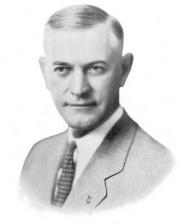Get Today in Masonic History into your Inbox. Sign up today for one of our email lists!
Need an article for your Trestleboard/Newsletter see our Use Policy
Harry Guyer Leslie Passes Away

Today in Masonic History Harry Guyer Leslie passes away in 1937.
Harry Guyer Leslie was an American politician.
Leslie was born on April 6th, 1878 in West Lafayette, Indiana. He attended public schools. In 1898 he was elected to his first public position of town clerk. He also enrolled in the newly constructed Purdue University. There he was a member of the masonic connected college fraternity Acacia. He was captain of both the baseball and football team. In 1903 he was traveling to Indianapolis by train with the rest of the train when tragedy struck. The train they were riding on ran head on into another train. The car the team was riding in was crushed. One member of the team was ejected from the train and miraculously landed on his feet. Leslie and the rest of the team were not so lucky. The rest of the team, including Leslie, were declared dead on the scene. At the morgue as they were getting ready to embalm Leslie's body they discovered he was still alive. He hovered at the edge of death for several weeks. He eventually recovered, although he walked with a cane for the rest of his life. Because of the incident Leslie became something of a folk hero.
Leslie eventually graduated from Purdue and went on to the Indiana Law School where he graduated in 1907. He opened a law practice in Lafayette and entered local politics and became president of a local bank he was invested in.
In 1923, Leslie was elected to represent Warren County in the Indiana House of Representatives. He was well known for his down to earth method of speaking and quickly made many allies. He was reelected twice and was elected in 1925 as the Speaker of the House, remaining in the position until he left in 1929.
In 1925 the issue which consumed Leslie's speakership began. The leader of the Indiana Klu Klux Klan, D.C. Stephenson, was arrested for the rape and murder of a young woman. Stephenson's arrest sent shockwaves through all levels of government in the state. Stephenson's arrest revealed there were large numbers of members of the Klan in the General Assembly, more than 50%, and where they were not in elected offices many had been bribing those officials. Leslie, like many others at the time were unaware of how much power the Klan was wielding in the General Assembly. The Klan in Indiana was largely anti-Catholic and Leslie blocked them on much of their anti-Catholic legislation. He also blocked them on committee assignments and other critical decisions. Stephenson was convicted in 1925 and in 1926, began naming names of individuals who had accepted bribes, this included the sitting Republican governor Edward L. Jackson, who was rumored to be a member of the Klan himself.
Leslie ran for Governor in 1928 and eventually received the nomination at the state convention. Neither Leslie or the other four candidates received a clear majority. He went on to win the Governors office and one of his first actions was to repeal the 1915 primary election laws the Klan used to remain in power. The same year he took office the Great Depression began. Leslie was an optimist and did little initially to give relief since he believed the Depression was short lived. As the Depression continued on, Leslie hired the unemployed to go work on the state roads. He advocated for the same program on the Federal level and eventually the Works Progress Administration followed suit.
After leaving office Leslie was a founder and later President of Standard Life Insurance Company in Indianapolis. He was good friends with playwright George Ade and Will Rogers. During a visit with his friend Ade in Florida Leslie suffered a heart attack and passed away on December 10th, 1937.
Leslie was a member of Lafayette Lodge No. 123 in Lafayette, Indiana. He was also a member of the Ancient Accepted Scottish Rite, Northern Masonic Jurisdiction and was a 33°.
This article provided by Brother Eric C. Steele.

